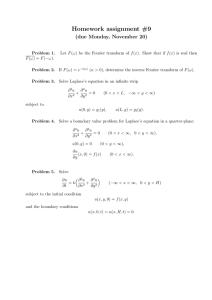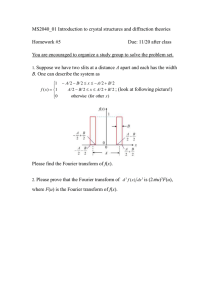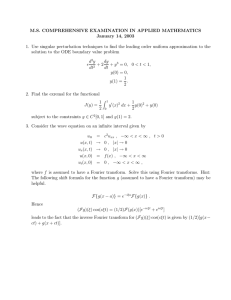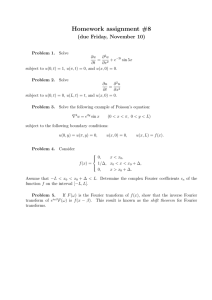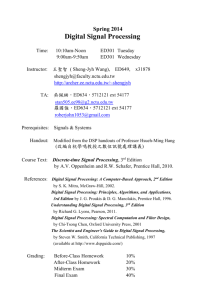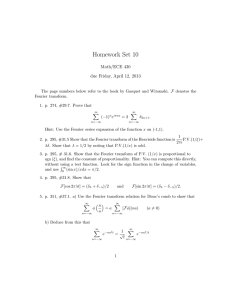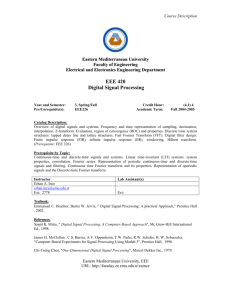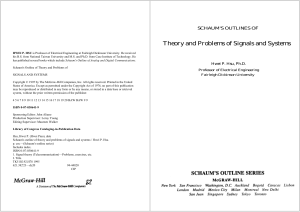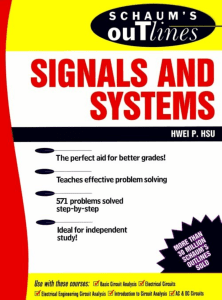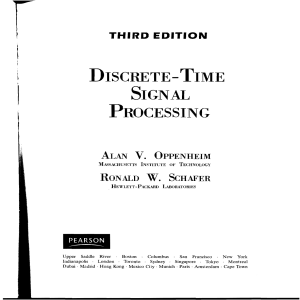EECS360 – Fall 2006 Lectures
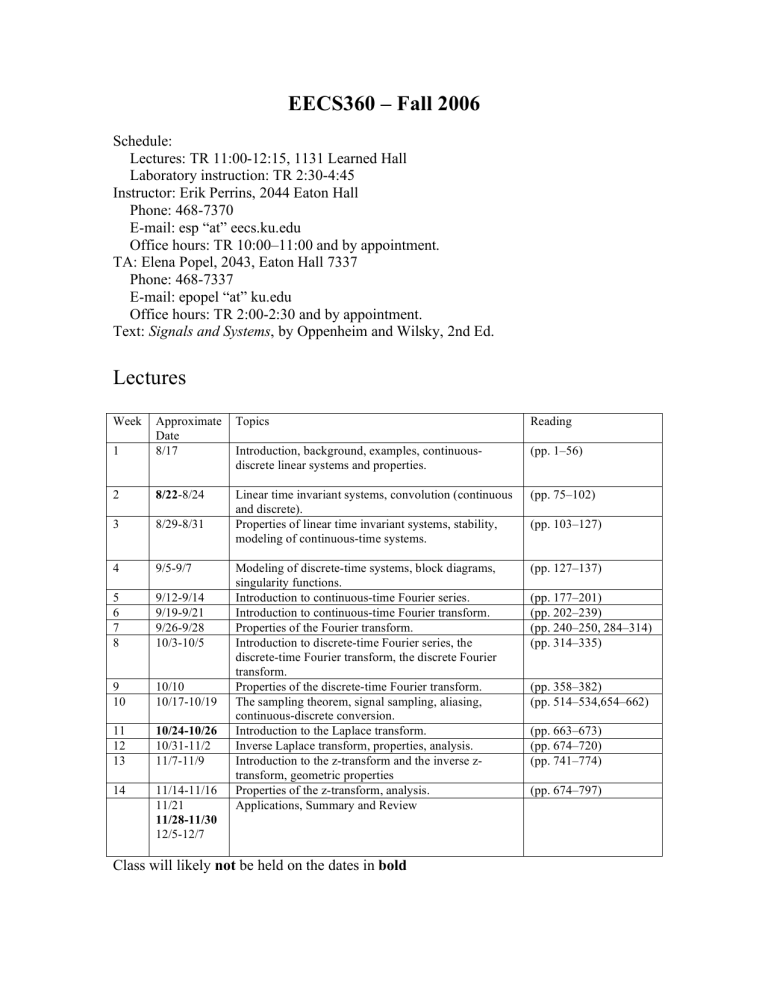
EECS360 – Fall 2006
Schedule:
Lectures: TR 11:00-12:15, 1131 Learned Hall
Laboratory instruction: TR 2:30-4:45
Instructor: Erik Perrins, 2044 Eaton Hall
Phone: 468-7370
E-mail: esp “at” eecs.ku.edu
Office hours: TR 10:00–11:00 and by appointment.
TA: Elena Popel, 2043, Eaton Hall 7337
Phone: 468-7337
E-mail: epopel “at” ku.edu
Office hours: TR 2:00-2:30 and by appointment.
Text: Signals and Systems , by Oppenheim and Wilsky, 2nd Ed.
Lectures
5
6
7
8
Week Approximate
Date
1
2
3
4
9
10
8/17
8/22 -8/24
8/29-8/31
9/5-9/7
Topics
Introduction, background, examples, continuousdiscrete linear systems and properties.
Linear time invariant systems, convolution (continuous and discrete).
Properties of linear time invariant systems, stability, modeling of continuous-time systems.
Modeling of discrete-time systems, block diagrams, singularity functions.
9/12-9/14
9/19-9/21
9/26-9/28
10/3-10/5
Introduction to continuous-time Fourier series.
Introduction to continuous-time Fourier transform.
Properties of the Fourier transform.
Introduction to discrete-time Fourier series, the
10/10 discrete-time Fourier transform, the discrete Fourier transform.
Properties of the discrete-time Fourier transform.
10/17-10/19 The sampling theorem, signal sampling, aliasing, continuous-discrete conversion.
11
12
13
14
10/24-10/26 Introduction to the Laplace transform.
10/31-11/2 Inverse Laplace transform, properties, analysis.
11/7-11/9 Introduction to the z-transform and the inverse ztransform, geometric properties
11/14-11/16 Properties of the z-transform, analysis.
11/21 Applications, Summary and Review
11/28-11/30
12/5-12/7
Class will likely not be held on the dates in bold
Reading
(pp. 1–56)
(pp. 75–102)
(pp. 103–127)
(pp. 127–137)
(pp. 177–201)
(pp. 202–239)
(pp. 240–250, 284–314)
(pp. 314–335)
(pp. 358–382)
(pp. 514–534,654–662)
(pp. 663–673)
(pp. 674–720)
(pp. 741–774)
(pp. 674–797)
9
10
11
12
13
14
5
6
7
8
1
2
3
4
Homework
EECS 360 is a challenging course. The homework counts for only a small percentage of your final grade. The main purpose of the homework is to “drive home” the concepts that are covered in class and to prepare you for the exams. Homework will be due in class each Thursday at the beginning of class. Late homework will not be graded.
You may work together on the homework assignments and you will probably find this to be helpful. You should take full advantage of your fellow classmates by learning and explaining the concepts that are developed in the homework assignments.
Week Problems
1.21, 1.27, 1.30, 1.31, 1.34, 1.38
2.21, 2.22, 2.27, 2.40, 2.43
2.30, 2.32, 2.33, 2.45, 2.48
3.21, 3.24, 3.26, 3.40, 3.42
3.46, 3.49, 3.52, 3.54, 3.55, 3.58
Midterm 1
4.21abc, 4.22abc, 4.23, 4.26, 4.29, 4.31
4.38, 4.41, 4.45
5.24, 5.26, 5.29, 5.30, 5.42
7.22, 7.23, 7.26, 7.28, 7.29
Midterm 2
9.21, 9.22, 9.23
9.25, 9.27, 9.28
10.21, 10.25, 10.26, 10.33, 10.34, 10.37
Laboratories
See the lab syllabus.
Exams
Two midterm exams will be given during the semester. These will cover material presented up to the exam time. The final exam will cover course material presented during the entire semester.
Grading
Homework (10%)
Laboratory (20%)
Midterm 1 (20%)
Midterm 2 (20%)
Final Exam (30%)
Grading Scale
100 – 90: A
89 – 80: B
79 – 70: C
69 – 60: D
59 – 0: F
Prerequisites
EECS 212 and upper-level EECS eligibility.
Goals Of The Course
This course is mainly a “theory” course rather than an “applied” course. It focuses on the development of analysis techniques, which define a body of knowledge that has a variety of potential specific applications. You will not find any applications covered in any great detail in this course. The examples we cover are chosen for their ability to increase your understanding of the core material of this course. You will have ample opportunity to apply the concepts learned here in the years that follow.
Comments
1. I expect that you will have read the assigned material before I lecture on it. The textbook is excellent and self-contained, but I reserve the right to draw upon my own experience and other materials as needed.
2. We will move at a quick, uniform pace. I assume that you are all mature, motivated students, and will look after your own best interests. If you are unclear on the subject matter, or are falling behind for any reason, I expect you to talk to me before it becomes a serious problem. FYI, approaching me with your problem after the final exam has been taken is an example of waiting too long.
3. You are welcome to talk with me about the class material. The best time is during regular office hours. If these times are inconvenient for you, we can schedule another time that works for both of us.
4. Outside of the homework assignments, I expect that the work you submit for evaluation is entirely your own. Violations of this expectation will be dealt with most severely. Any kind of academic dishonesty will result in a zero for the particular item of work and might result in an F for the class and further disciplinary action, including probation or expulsion.
